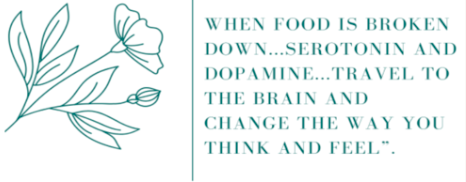YOU ARE WHAT YOU EAT: FIGHTING ANXIETY AND DEPRESSION ONE BITE AT A TIME BY CASSIE QUICK
We’ve heard the age old expression “you are what you eat” probably more times than we can count. And for most of my life, this adage has conjured up images from elementary school health books...the dazzling, bright smiles of the happy dancing glass of milk and over-sized pieces of fruit in contrast to the sad, run-down can of soda and chocolate bar slumped on the ground. It’s an oversimplified lesson, yes, but as human beings, we generally agree that healthy, whole foods make us feel better while processed, sugary junk foods do not (think about how your stomach feels after a big handful of Halloween candy vs. after eating a spinach and strawberry salad). But, as recent research shows, the link between our food choices and our health goes far beyond unpleasant physical side effects - our diet can directly impact our mental and emotional health as well. The gut and the brain influence each other profoundly!
Anxiety and depression are mental health conditions that several members of my family live with. Some are supported by healthcare professionals, therapy and prescription medications, some have turned to yoga and mediation and some have chosen to self-soothe with drugs and alcohol….and some have tried a creative combination of all three. But regardless of coping style, the struggles are real. And my family is not unique. In 2017, according to the Anxiety and Depression Association of America, over 40 million Americans suffered from anxiety and 17 million experienced a depressive episode. And these statistics were published well before a global pandemic came to town!
In an effort to learn more about how the foods we eat may impact mental health, I recently read Dr. Uma Naidoo’s book This is Your Brain on Food. This book focuses on the benefits of nutritional psychiatry and provides scientific data supporting the idea that we actually are (and feel) what we eat. For instance, serotonin - a major brain chemical responsible for regulating mood and emotion - is largely produced in the gut. People who suffer from depression often have deficient levels of serotonin in their brains. Amazingly, there are certain foods like probiotics, fish, eggs and seeds that can increase serotonin production in the human body with the possibility of positively affecting mood. A 2018 study found that patients with Generalized Anxiety Disorder (GAD) had very different gut bacteria: theirs was less diverse and more sparse, compared to their healthy counterparts. Those with GAD also had higher levels of bad bacteria living within their digestive tract. Aged, fermented and cultured foods like yogurt, kimchi and sauerkraut can enhance healthy gut function and may decrease symptoms of social anxiety. Dr. Naidoo states that “food influences your brain directly and indirectly. When food is broken down by the microbiota [of the gut] into fermented and digested materials, its components directly influence the same kinds of neurotransmitters….such as serotonin and dopamine...and travel to the brain and change the way you think and feel”.
The gut-brain relationship is complex and changes to brain chemistry can cause things to go quite wrong. In her book, Dr. Naidoo explains these different chemical processes and provides research that supports how whole foods can affect the production of “good” bacteria in the gut. In turn, these good bacteria manufacture certain brain chemicals that have a therapeutic impact on mental health conditions like anxiety, depression, PTSD, ADHD and more.
Below you will find a list of foods to consider incorporating (or avoiding) into your diet with the hopes of feeling better and reducing suffering as it relates to anxiety and depression. But to reiterate Dr. Naidoo’s important advice, changing your diet does not overshadow the importance of working with your doctor and taking medications that they feel are important to your health. Diet and food choices are a compliment to other more traditional types of treatment...and together, they can lead to better mental health, one bit at a time!
Foods to Eat to Ease Depression:
Probiotics (yogurt with active cultures, kefir, kombucha, miso, sauerkraut, certain cheeses)
Prebiotics (beans, oats, bananas, berries, garlic, onion, dandelion greens, asparagus, leeks, jerusalem artichokes)
Low-GI Carbs (brown rice, quinoa, steel-cut oatmeal, chia seeds)
Med-GI Foods (in moderation: honey, orange juice, whole grain bread)
Healthy Fats (olive oil, nuts, nut butters, avocados)
Omega-3 fatty acids (fish, especially salmon tuna, mackerel, herring, sardines)
Vitamins B9, B12, B6, A, C
Minerals and Macronutrients (iron, magnesium, potassium, zinc, selenium)
Spices (saffron, turmeric)
Herbs (oregano, lavender, passionflower, chamomile)
Foods to Avoid:
Sugar (candy, soda, baked goods, anything sweetened with high fructose corn syrup)
High-GI carbs (white bread, white rice, potatoes, pasta)
Artificial sweeteners (aspartame, saccharin, stevia, sucralose)
Fried Foods
Bad Fats (margarine, shortening, hydrogenated oils)
Nitrates (an additive in bacon, salami, sausage and other cured meats)
Foods to Eat to Ease Anxiety:
High Fiber (beans, broccoli, brown rice, berries, bran, pears, apples, bananas, brussel sprouts, carrots, artichokes, almonds, walnuts, oats, buckwheat, amaranth, pearl barley)
Aged, Fermented and Cultured Foods (yogurt, kombucha, miso, tempeh, apple-cider vinegar, pickled vegetables)
Tryptophan (turkey, chickpeas when combined with carbohydrates)
Vitamins D, B1, B6, A, C, E
Minerals (magnesium, potassium, selenium)
Spices (turmeric)
Herbs (lavender, passionflower, chamomile)
Foods to Avoid:
Components of the Western Diet (bad fats found in red meat and fried foods, high-GI Carbs like white bread, white rice, potatoes, pasta)
Caffeine (stay under 400mg per day)
Alcohol (for men, no more than 2 drinks per day and for women, no more than 1 per day)
Gluten (if you have celiac disease or non-celiac gluten sensitivity)
Artificial Sweeteners (aspartame, saccharin)
When working on issues related to your physical and mental health it is always best to consult with your care provider prior to making any lifestyle changes.
With Gratitude,
Cassie



